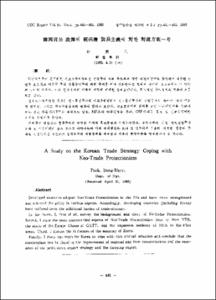인지적 제조 시스템을 위한 공정 설계 전략-개념적 모형
- Alternative Title
- A Process Design Strategy for Information Manufacturing System- A Conceptual Model
- Abstract
- This study suggest conceptual models using experiential cognition, reflective cognition, and motivation variables and also develops propositions for empirical study by field observation.
Job characteristic model for job design and recent cognitive engineering studies for process design are reviewed briefly. By using these concepts, lean production system was interpreted in terms of cognitive engineering and the latent dimensions of the lean production system are revealed as the application of cognitive engineering principles.
Integrated process design framework for cognitive manufacturing system using job characteristic model is suggested for effective design of manufacturing system.
Experiential cognition and reflective cognition make four possible modes of cognitive design-reactive mode, entrepreneurial mode, planning mode, adapting mode. Of which planning mode is regarded as the most important mode at the level of operator for manufacturing system design.
By using dimensions of the task motivation potential and the experiential cognition, four process design strategies-machine resource centered process design strategy, human resource dependent process design strategy, machine resource dependent process design strategy, and human resource centered process design strategy-are suggested. In the complex and dynamic environment, human resource centered process design strategy is emphasized for effective manufacturing system.
Propositions for empirical analysis of this model are also developed through theoretical analysis as well as field observation. Propositions are (1) experiential cognition and motivation potential affect the ability, role perception, and motivation of the operator in the manufacturing system (2) the ability, role perception, and motivation of the operator affect the manufacturing performance.
This study suggest conceptual models using experiential cognition, reflective cognition, and motivation variables and also develops propositions for empirical study by field observation.
Job characteristic model for job design and recent cognitive engineering studies for process design are reviewed briefly. By using these concepts, lean production system was interpreted in terms of cognitive engineering and the latent dimensions of the lean production system are revealed as the application of cognitive engineering principles.
Integrated process design framework for cognitive manufacturing system using job characteristic model is suggested for effective design of manufacturing system.
Experiential cognition and reflective cognition make four possible modes of cognitive design-reactive mode, entrepreneurial mode, planning mode, adapting mode. Of which planning mode is regarded as the most important mode at the level of operator for manufacturing system design.
By using dimensions of the task motivation potential and the experiential cognition, four process design strategies-machine resource centered process design strategy, human resource dependent process design strategy, machine resource dependent process design strategy, and human resource centered process design strategy-are suggested. In the complex and dynamic environment, human resource centered process design strategy is emphasized for effective manufacturing system.
Propositions for empirical analysis of this model are also developed through theoretical analysis as well as field observation. Propositions are (1) experiential cognition and motivation potential affect the ability, role perception, and motivation of the operator in the manufacturing system (2) the ability, role perception, and motivation of the operator affect the manufacturing performance.
- Issued Date
- 1999
- Type
- Research Laboratory
- Alternative Author(s)
- Kim,Yearn-Min
- Publisher
- 공학연구논문집
- Language
- kor
- Rights
- 울산대학교 저작물은 저작권에 의해 보호받습니다.
- Citation Volume
- 30
- Citation Number
- 2
- Citation Start Page
- 233
- Citation End Page
- 246
- Appears in Collections:
- Research Laboratory > Engineering Research
- 파일 목록
-
-
Download
 000002025009.pdf
기타 데이터 / 1.38 MB / Adobe PDF
000002025009.pdf
기타 데이터 / 1.38 MB / Adobe PDF
-
Items in Repository are protected by copyright, with all rights reserved, unless otherwise indicated.